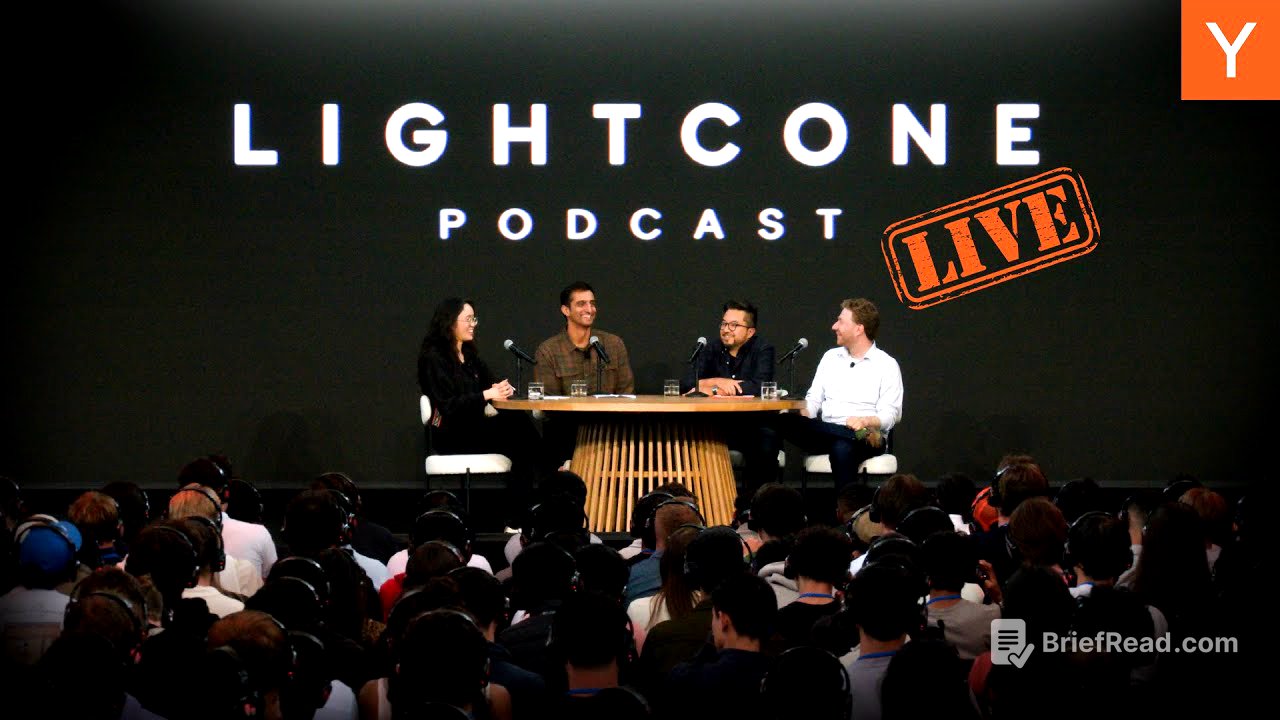TLDR;
This discussion explores the impact of AI on career paths, education, and startup strategies. It challenges traditional notions of career safety and credentialing, highlighting the importance of agency, domain expertise, and real-world impact over superficial achievements. The conversation also touches on social media's role in startups and offers advice on when to leave a job to pursue entrepreneurial ventures.
- AI's impact on job market and education
- Importance of agency and domain expertise
- Social media strategy for startups
- Deciding when to quit your job for a startup
The Inverted Career Risk Paradigm [4:18]
The speakers discuss the uncertainty created by AI, particularly among students, regarding future job availability. They question whether traditional, stable career paths, such as becoming a level 59 engineer at Microsoft, are still the safest choices. The conversation highlights a surprising statistic: the unemployment rate for computer science majors is higher than that of art history majors, suggesting a possible inversion of career risk due to AI's increasing capabilities.
AI's Impact on Education and Skills [5:16]
The discussion shifts to the skills that college students need to thrive in a post-AI world. Traditional education, which focuses on following instructions and passing tests, may no longer be sufficient. The panel emphasises the importance of agency, independence, and the ability to do things oneself. They note that many CS curricula are outdated, even prohibiting the use of AI coding tools like Cursor, which are essential for future success.
Agency vs. Credential Maxing [7:08]
The panel questions whether this is the last window to get rich, considering the potential impact of AGI (Artificial General Intelligence). They critique the idea of "credential maxing," particularly in San Francisco, and stress that people do their best work out of excitement rather than fear. The speakers advise against starting an AI startup solely out of fear of missing out, advocating for positive motivations.
Motivation: Fear or Excitement [8:28]
The speakers advocate for pursuing opportunities out of excitement rather than fear, highlighting the rapid growth potential of AI startups. They contrast the milestones of past startups, such as raising a Series A round, with the current landscape, where AI companies can achieve billion-dollar valuations within a couple of years. This accelerated growth offers a compelling reason to consider joining or starting a company.
The Accelerated Growth of AI Startups [9:43]
The discussion emphasises that the potential for rapid growth in AI startups makes it an exciting time to be a builder. They highlight the unprecedented growth of B2B SaaS companies, which are experiencing hypergrowth unlike anything seen before. This inversion, where B2B SaaS companies are growing faster than consumer social companies, underscores the unique opportunities in the current tech landscape.
Real Success over Fake Credentials [10:50]
The panel contrasts the "fake credential" of raising a Series A round with the real success of generating substantial revenue. They highlight examples of small teams achieving millions in annual revenue, which represents a tangible impact. This shift towards real business outcomes over external validation is a key theme, encouraging founders to focus on building products that people need and are willing to pay for.
Domain Expertise and Technical Expertise [12:55]
The discussion addresses the importance of domain expertise (understanding the customer and market) and technical expertise in building successful products. They argue that pre-AI, domain expertise was more critical due to the saturation of web software. However, with AI, technical expertise has become the missing piece, as it is now more challenging to reliably deliver the "magic" that AI promises.
Gaining Domain Expertise as a Student [15:05]
The panel offers advice to college students who lack domain expertise, suggesting they become "forward-deployed engineers" by immersing themselves in specific industries to understand real needs. They cite examples like Flexport, where the founder gained expertise by becoming a top importer of medical hot tubs. The speakers emphasise that genuine interest and a hunch can be powerful drivers for creating enduring businesses.
Breaking the Student Mindset [18:51]
The speakers discuss the pitfalls that prevent people from exercising their agency, particularly the "student mindset." They note that many students treat startups like another test, seeking to check predetermined boxes. The panel stresses that building a startup is an open space with no rules, where founders have the agency to set their own goals and design their own paths.
The Dangers of Entrepreneurship Programs [20:39]
The panel warns against the dangers of certain entrepreneurship programs that may inadvertently teach students to lie or focus on superficial achievements like raising money. They argue that in an era of abundant opportunity, there is no need to fake it till you make it. The speakers critique programs that treat entrepreneurship as a course with a series of tests, rather than a dynamic, real-world endeavour.
Social Media Strategy for Startups [22:52]
The discussion explores the role of social media in amplifying a startup's message and brand. While acknowledging the potential benefits, the panel cautions against prioritising online attention over real-world impact. They advocate for telling an authentic story and working backwards from desired outcomes, using social media to showcase substance rather than flash.
The College Dropout Question [27:30]
The panel addresses the dilemma of whether to drop out of college to pursue a startup, advising the student to consider whether they trust the startup and whether they genuinely enjoy being in college. They caution against making fear-based decisions driven by FOMO (fear of missing out). The speakers suggest exploring alternative life paths through internships before committing to a startup.
When to Quit Your Job [32:33]
The discussion concludes with advice on when to quit a job to start a company. The panel recommends having at least six to nine months of living expenses saved and emphasises the importance of working with smart co-founders. They note that the biggest limiting factor for many is the timing of both co-founders being willing to quit their jobs simultaneously, suggesting that if this alignment occurs, it may be the right time to take the leap.









